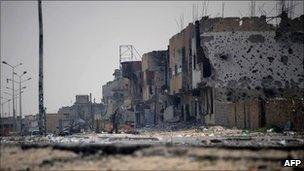Libya: Misrata port shelled despite Nato effort
- Published

Misrata has come under attack by Libyan government forces attempting to retake the besieged city.
Three people were reportedly killed as missiles slammed into the city's port, a lifeline for those seeking to escape to the rebel stronghold Benghazi.
Nato is enforcing a UN resolution to protect civilians in Libya amid a two-month revolt inspired by other uprisings in the Arab world.
The UN Security Council is meeting to discuss a statement on the unrest.
Proposed by the UK, France, Germany and Portugal, the draft statement condemns the deadly violence against Syrian civilians and backs a call made by Ban Ki-moon for a "transparent" independent investigation into the deaths.
A Nato air strike earlier damaged Col Gaddafi's compound in Tripoli.
That attack followed big explosions at the Libyan leader's sprawling Bab al-Azizia compound early on Monday, which government spokesman Moussa Ibrahim called "an attempt to assassinate the leader and other political leaders of this country".
The Tripoli strikes have sparked angry criticism from Russian Prime Minister Vladimir Putin, who said the Western coalition had no mandate to kill Col Gaddafi.
US Defence Secretary Robert Gates on Tuesday denied the alliance was trying to assassinate Libya's leader. He was speaking at a Washington press conference with UK Defence Secretary Liam Fox, who said it was clear that the Libyan regime was "on the back foot".
"[Col Gaddafi] is a liability for his people and his country and the sooner that he gets this message, the better," Liam Fox.
He also decried Libya's use of young mercenary soldiers on the front lines, saying it was a "sign of desperation from a regime that they resort to these sort of tactics".
Deadly shelling
The rebel-held city of Misrata has been besieged by government forces for two months, during which time parts of the city have had neither electricity nor water.
Continued sniper fire, street clashes and shelling have prevented people from venturing outside their homes to get food and medicine.
Human rights groups say more than 1,000 people have been killed in the fighting and many more have been wounded. Ships have been ferrying the injured to hospitals in the rebel stronghold, Benghazi.
Access to the sea has been lifeline for the city, allowing residents to leave and aid to come in, says the BBC's Peter Biles in Benghazi.
At the weekend, Col Gaddafi's regime claimed to have suspended operations in Misrata, and its forces withdrew in places.
Since then, however, the deadly shelling has continued, with Misrata surrounded on three sides and seeing some of the worst violence since the siege began.
"It was horrific, like a scene from World War II," said Misrata resident Saddoun el-Misurati as rockets began falling on the port on Tuesday.
He told the Associated Press he had been waiting with his mother for a boat to evacuate them from the port with hundreds of residents and migrant African workers. The crowds scattered for cover when the shelling started, he added, and the ship - sent by the International Organisation of Migration - was forced to stay offshore.
Libya's government denies it has been indiscriminately shelling civilian areas.
RAF fighter aircraft "successfully attacked" three armoured personnel carriers near Misrata over the weekend, Prime Minister David Cameron's office said, but warned UK forces "must prepare for the long haul" in Libya.
UK Foreign Secretary William Hague said the UK was taking steps to evacuate 5,000 people from the city, as well as providing much-needed food, water and medicine supplies.
"The regime must grant unfettered humanitarian access, not just broken promises that puts aid workers and civilians at risk," Mr Hague told MPs on Tuesday.
Mr Hague said Nato's 1,500 strike sorties over Libya had "seriously degraded Gaddafi's military assets and prevented widespread massacres planned by Gaddafi's forces.
"They remain unable to enter Benghazi and it is highly likely that without these efforts Misrata would have fallen, with terrible consequences for that city's brave inhabitants."
The UK has for weeks called for more commitment from Nato members to the operation in Libya, but on Monday Russia said the Western military intervention risked fanning a series of civil wars across the Middle East.
Italy, France and Britain last week agreed to send military advisers to assist the Benghazi-based rebel Transitional National Council (TNC) in its battle against pro-Gaddafi forces.
The US launched its first Predator drone strikes against pro-Gaddafi military positions over the weekend, which the Libyan government denounced as crimes against humanity.
Libya's government on Tuesday called for an African Union summit as soon as possible to mobilise the continent against the Nato air strikes.
Libya has also urged Russia to convene an emergency meeting of the UN Security Council to discuss the "immoderate colonial and crusader aggression which has been hitting Libyan civilian targets", the state news agency said.
Mr Putin earlier criticised the Nato air strikes for going beyond the mandate provided by the UN Security Council resolution to protect civilians in Libya.
The UNHCR estimates some 30,000 civilians have fled their homes in Libya's Western Mountain region and crossed to southern Tunisia in the past three weeks, leaving some towns virtually deserted.
On Tuesday the first UNHCR humanitarian plane landed in Benghazi carrying relief assistance including hospital tents, kitchen sets as well as plastic sheets for shelter.
Meanwhile, it has emerged Libya has been taking advantage of a loophole in United Nations sanctions against Col Gaddafi's government by importing gasoline from the Italian refiner, Saras.
The shipment is legal because the buyer, Libya's General National Maritime Transport Company (GNMTC), is not on a UN blacklist.